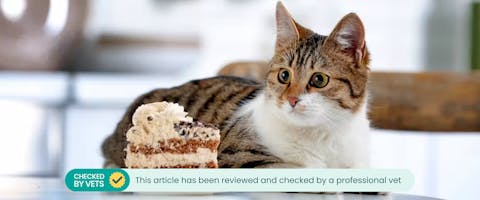Updated 12/05/2023
From cakes to sauces and even stews, butter has found its way into countless dishes and snacks in the human world, so most of us have a pretty good tolerance for it. But can cats eat butter, or is butter poisonous to cats? Let’s find out.
Trending posts
Purr-use some of the top blogs our members have been loving this month- Top male dog names for your new furry friendGot a new furry family member in your pack? Check…

- Top female dog names for your new fluffy palWelcoming a new pooch into your family? Explore…

- 250+ gray cat names your silver feline will loveRecently welcomed a fluffy gray bundle of joy into…

- What are normal pet sitting rates?Discover the average pet sitting rates for animals…

- Unique dog names to stand out from the packDare to be different with our list of the best…

Can cats eat butter?
You shouldn’t be feeding your cat butter - our feline friends are obligate carnivores, so a healthy diet is a meat-based one. If you’re not sure what you should be feeding your cat, start with commercially-available cat foods that are suited for your kitty’s age, breed and any health issues they might have. Also, consult your vet if you’re thinking about drastically changing your kitty’s diet in any way.
Is butter safe for cats?
No, butter is seriously bad for our feline friends, so completely steer clear of the stuff. Firstly, it’s a fat, so naturally it has a seriously high-fat content. Anything with fat at such a high volume should be avoided for your kitty, as obesity is seriously bad news in the feline world. Also if you feed your cat a high-fat diet they are more prone to developing conditions such as diabetes. Secondly, consider why you’re thinking about feeding your cat butter in the first place - maybe it’s a delicious snack that you enjoy, but a cat-safe snack is most definitely the better option (no matter how much they beg for a nibble of your cake!) and there are dozens of healthy, safe alternatives.
Is butter poisonous to cats?
Technically butter isn’t poisonous to cats (like onion or garlic), but that’s not to say that it’s good for them. In fact, butter is seriously bad for our feline friends, and should never be fed to them. It’s high in fat (which is bad news for your cat) and contains lactose, which is also a reason to avoid the stuff. Many cats are lactose intolerant, so there’s a high chance your cat could have a bad reaction. Signs of this include vomiting, diarrhea, abdominal discomfort and bloating after eating dairy products containing lactose.
Why is butter bad for cats?
The fat in butter can cause vomiting and diarrhea, and if fed over a long period of time, can cause obesity in cats. Butter may also cause gastroenteritis, which is inflammation of the lining of the intestines, or pancreatitis which is the inflammation of the pancreas. The latter is life-threatening, so we can safely say that feeding your cat butter (or foods containing the stuff) simply isn’t worth it. Cats fed butter are also at greater risk of developing diabetes.
What to do if your cat eats butter
If you accidentally left the butter dish out and you catch your kitty sneakily licking their lips, it’s not anything to panic about. Butter isn’t toxic to cats, but you should keep an eye on your feline friend in the hours following, just in case any vomiting or diarrhea occurs. Then, just be sure to put the butter away next time - long-term consumption is bad news!
Meet our veterinary expert, Emma
This article has been checked by veterinarian Emma Chandley, BVetMed MRCVS PGCertSAS. Emma graduated from the Royal Vet College in London in 2011. She has a keen interest in surgery and went on to do a postgraduate certificate in small animal surgery and was then awarded advanced practitioner status in the same discipline.
Other foods that aren’t safe for cats
While it seems that us humans can stomach (almost) anything, the stomachs of our feline friends are a whole lot more sensitive. So, like any responsible pet parent, find out what your cat can and can’t eat to be on the safe side. And if you’re house sitting, only feed your new kitty pal what you’ve been asked to. To get you started, here are a few foods that many of us humans love that simply aren’t safe for cats…

